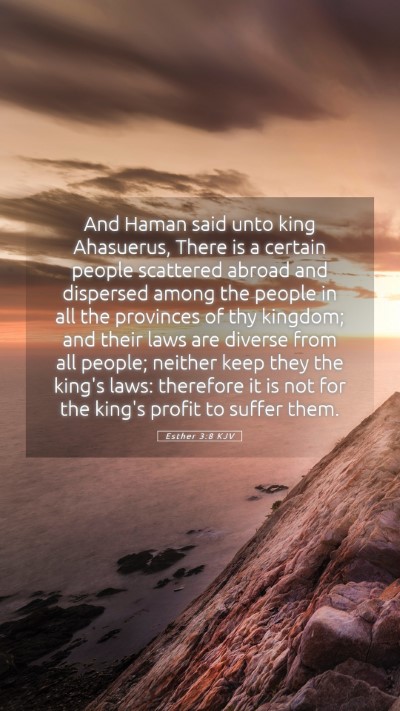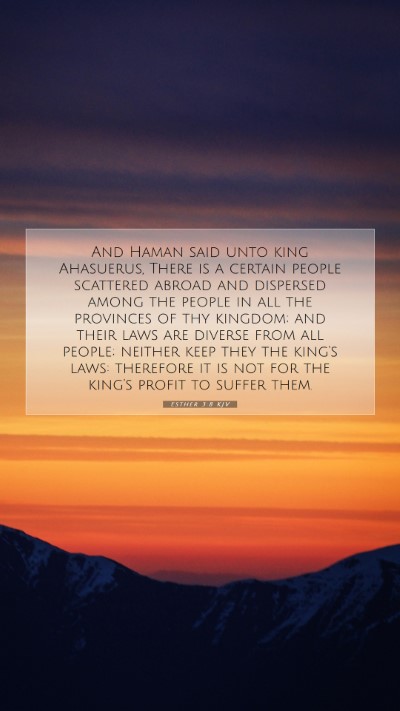Old Testament
Genesis Exodus Leviticus Numbers Deuteronomy Joshua Judges Ruth 1 Samuel 2 Samuel 1 Kings 2 Kings 1 Chronicles 2 Chronicles Ezra Nehemiah Esther Job Psalms Proverbs Ecclesiastes Song of Solomon Isaiah Jeremiah Lamentations Ezekiel Daniel Hosea Joel Amos Obadiah Jonah Micah Nahum Habakkuk Zephaniah Haggai Zechariah MalachiEsther 3:8 Meaning
What is the meaning of Esther 3:8?
And Haman said unto king Ahasuerus, There is a certain people scattered abroad and dispersed among the people in all the provinces of thy kingdom; and their laws are diverse from all people; neither keep they the king's laws: therefore it is not for the king's profit to suffer them.
Esther 3:8 Bible Verse Meaning
Understanding Esther 3:8 - Bible Verse Explanation
Esther 3:8 states: "Then Haman said to King Ahasuerus, 'There is a certain people scattered and dispersed among the people in all the provinces of your kingdom; their laws are different from those of every other people, and they do not keep the king's laws. Therefore, it is not fitting for the king to let them remain.'" This passage sets the stage for the conflict between Haman and the Jewish people, as well as the divine providence that operates throughout the Book of Esther.
Contextual Background
This verse occurs in a pivotal moment in the Book of Esther, where Haman, an official in King Ahasuerus' court, seeks to eliminate the Jewish people. Understanding this context is crucial for proper Bible verse interpretation.
- Historical Context: The Jewish people, having been exiled and now living in Persia, face the threat of annihilation primarily due to Haman's hatred towards Mordecai, a Jew who refused to bow to him.
- Cultural Significance: The mention of "laws" highlights the cultural and religious distinctiveness of the Jews, which becomes a point of contention.
Key Themes in Esther 3:8
- The Nature of Prejudice: Haman’s argument to the king represents a prejudiced view against the Jewish people, suggesting that their difference in laws justifies their extermination.
- The Role of Authority: Haman manipulates King Ahasuerus’ authority to enact his personal vendetta, showcasing the influence individuals can wield within political structures.
- Divine Providence: Although Haman's intentions are evil, this verse sets the stage for God’s deliverance of His people, emphasizing the overarching theme of divine intervention seen in Esther.
Commentary Insights
Insight from various commentators reveals deep understanding of this verse:
- Matthew Henry: He highlights how Haman's deceitful insinuations serve to provoke the king against the Jews, portraying them as rebels, which indicates the false narrative often used to justify persecution.
- Albert Barnes: He provides insight on how Haman’s statement about the laws reflects not just legal differences but also a greater disdain for the Jewish faith and culture, which are seen as threats to Persian unity.
- Adam Clarke: He emphasizes that Haman's plea disguises his personal hatred and ambitions, pointing out the righteousness of the Jews amidst the malevolence directed toward them.
Bible Verse Meanings
The meanings derived from Esther 3:8 encompass various Bible study insights:
- This verse reveals the danger of letting prejudice and personal vendetta guide decisions made by those in power.
- It underscores the importance of understanding the unique laws and beliefs of different cultures, advocating for respect and coexistence rather than elimination.
- As part of Biblical exegesis, this verse serves as a reminder of the historical struggles of the Jewish people, which resonates through time.
Application of Esther 3:8 to Daily Life
Application of Bible verses to our daily lives can be realized through the following points:
- Recognizing and resisting the influence of prejudiced narratives in our communities.
- Understanding the significance of standing up for justice and the rights of others, particularly marginalized groups.
- Trusting in divine leadership and guidance when faced with overwhelming odds or hostility.
Cross References
Esther 3:8 is related to several other passages that deepen its significance:
- Exodus 23:22: "But if you indeed obey his voice and do all that I speak, then I will be an enemy to your enemies and an adversary to your adversaries."
- Psalm 37:28: "For the LORD loves justice, and does not forsake His saints; they are preserved forever."
- Proverbs 29:27: "An unjust man is an abomination to the righteous, but one whose way is straight is an abomination to the wicked."
Conclusion
By engaging with Esther 3:8 through Bible study tools and Bible study guides, we gain a comprehensive understanding of both the historical context and the spiritual lessons embedded within the text. As we reflect on the implications of Haman's actions and the nature of authority and justice, we are called to stand firm in our convictions and advocate for righteousness in our everyday lives.


